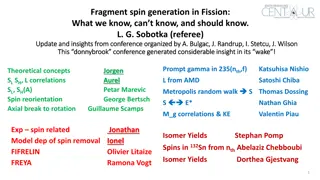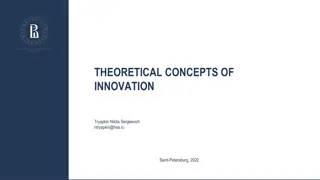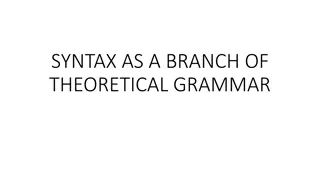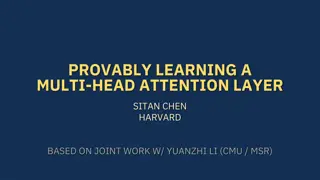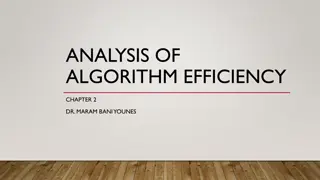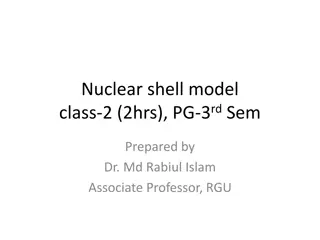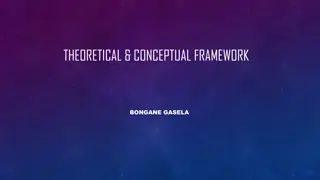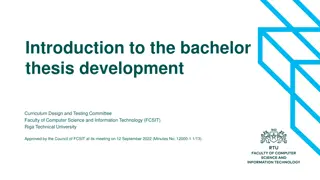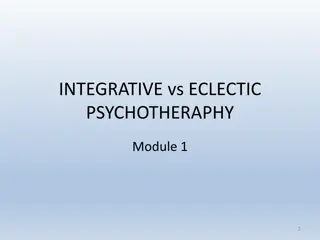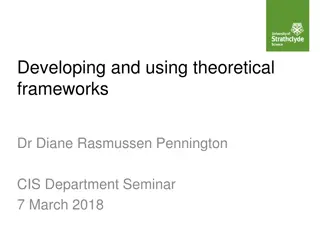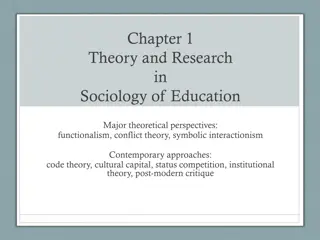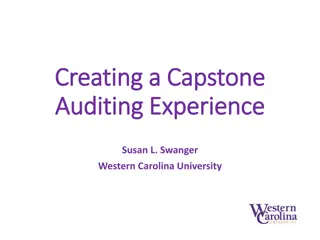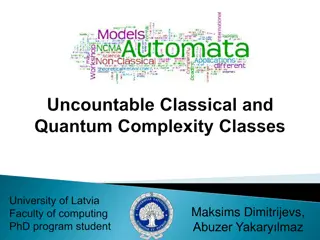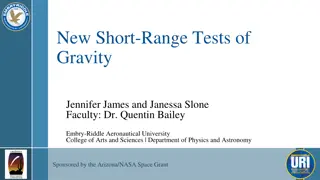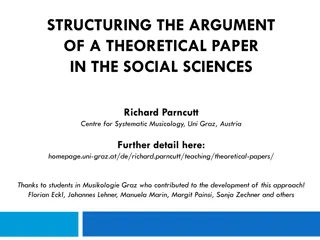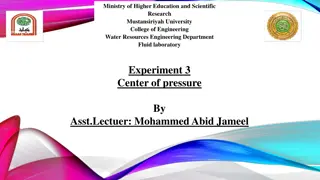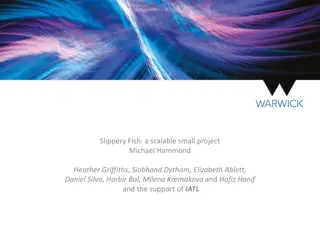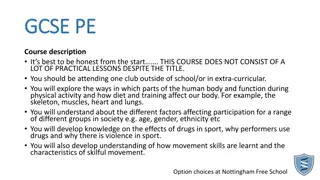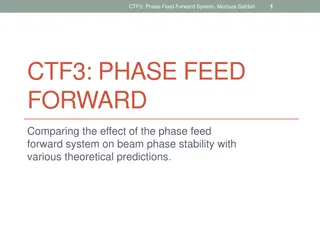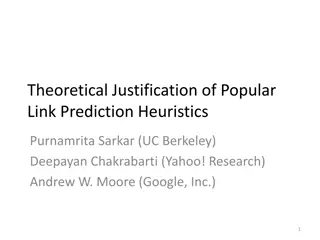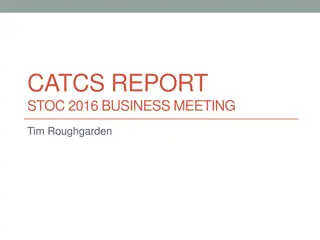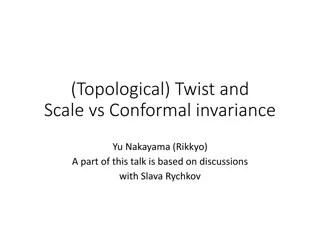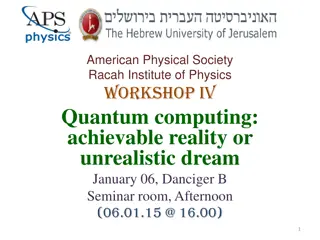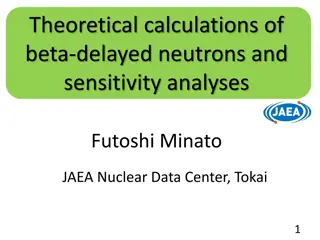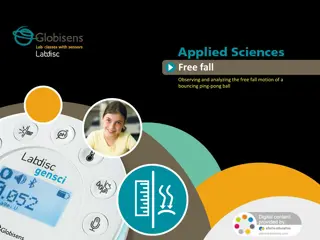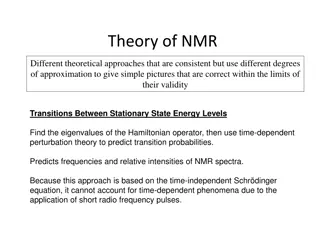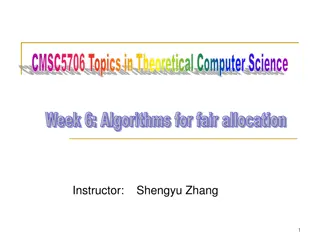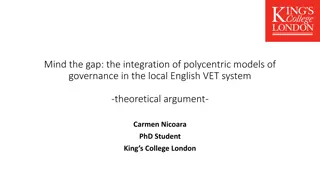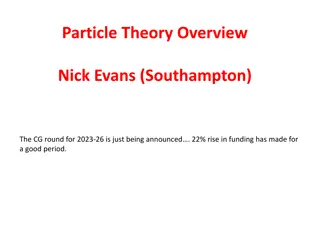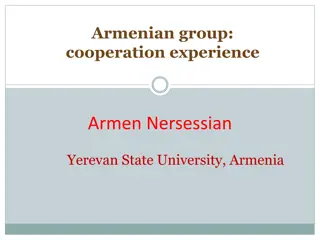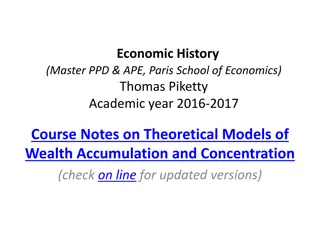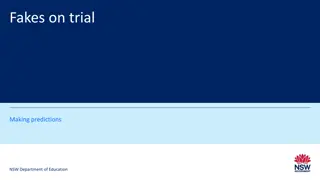Insights on Fragment Spin Generation in Fission: What We Know
Considerable insight was generated from a recent conference on fission, shedding light on crucial theoretical and experimental aspects. Key topics include angular momentum, fission-fragment spin references, and the dynamics of nuclear fission. Theoretical advancements like the TDSLDA model and super
3 views • 41 slides
Understanding Theoretical Concepts of Innovation and Diffusion Theories
Explore the theoretical concepts of innovation, comparing innovation vs. innovativeness and delving into the diffusion of innovation theory by Rogers. Discover how innovation, innovativeness, and the diffusion of innovation theory play crucial roles in organizational settings, impacting technology a
8 views • 19 slides
Understanding Syntax in Theoretical Grammar
Syntax, as a branch of theoretical grammar, explores the combination of words in phrases and sentences, focusing on their relationships and functions in communication. Basic syntactic notions, such as syntactic units, syntactic meaning, and syntactic relations, play a crucial role in shaping the str
5 views • 17 slides
Insights into Theoretical English Grammar
The theoretical English grammar delves into the subject matter of grammar, including systemic conceptions, grammatical forms, categories, paradigms, and morphological means. It discusses the constituent parts of language – phonology, lexicology, and grammar. The grammatical structure covers morpho
7 views • 26 slides
Overview of Stilistik in Bachelor's Studies
Stilistik in a Bachelor's program covers theoretical basics, stylistic concepts, micro and macro stylistics, and key texts in the field. It explores stylistic analysis, linguistic disciplines, communication styles, and the impact of style on various forms of expression including everyday communicati
6 views • 63 slides
Evolution of Development Communication: Theoretical Frameworks and Applications
Exploring the interdisciplinary field of Development Communication, this seminar delves into theoretical frameworks, methodological applications, and practical implications at the World Bank. It reflects on the evolution, theories, and practices underlying Development Communication paradigms, with a
4 views • 57 slides
Understanding Multi-Head Attention Layers in Transformers
Sitan Chen from Harvard presents joint work with Yuanzhi Li exploring the provable learnability of a multi-head attention layer in transformers. The talk delves into the architecture of transformers, highlighting the gap between practical success and theoretical understanding. Preliminaries, prior w
3 views • 38 slides
Contrasting Concepts in Political Science: Normative vs Descriptive Approaches
Normative and descriptive concepts in Political Science explore contrasting viewpoints on how things should be versus how they actually are. While normative claims focus on value judgments, descriptive claims deal with facts. These concepts complement each other by providing both theoretical and pra
0 views • 10 slides
Understanding Algorithm Efficiency Analysis
In this chapter, Dr. Maram Bani Younes delves into the analysis of algorithm efficiency, focusing on aspects such as order of growth, best case scenarios, and empirical analysis of time efficiency. The dimensions of generality, simplicity, time efficiency, and space efficiency are explored, with a d
1 views • 28 slides
Theoretical Derivation and Application of Nuclear Shell Model in Quantum Physics
Brought to you by Dr. Md. Rabiul Islam, Associate Professor at RGU, this presentation delves into the theoretical derivation of the shell model using Schrodinger wave equations in the presence of specific potentials. Exploring the solutions for the wave equation and explaining the role of quantum nu
1 views • 14 slides
Understanding Theoretical and Conceptual Frameworks in Research
The theoretical and conceptual frameworks in research play vital roles by grounding studies in theoretical constructs, enhancing rigor and empiricism, and guiding the research process. The theoretical framework provides a blueprint based on existing theories, guiding researchers in developing their
0 views • 12 slides
Understanding Theories and Concepts in Research
The content delves into the fundamental concepts of theories and variables in research. It discusses the nature of theories, including descriptive, explanatory, and predictive theories. Additionally, it examines the role of concepts in providing identity and meaning to objects and phenomena. Through
1 views • 55 slides
Importance of Bachelor Thesis in Computer Science Education
The Bachelor Thesis plays a crucial role in assessing students' achievement of study outcomes in Computer Science and Information Technology programs. It serves as a tool to strengthen theoretical knowledge, demonstrate problem-solving skills, and provide evidence of academic competence in the chose
0 views • 16 slides
Understanding Integrative and Eclectic Psychotherapy Approaches
Integrative Psychotherapy emphasizes treating individuals holistically across affective, behavioral, cognitive, and spiritual dimensions. It incorporates various theoretical perspectives like psychodynamic, client-centered, behaviorist, and cognitive therapies. Common factors in psychotherapy play a
3 views • 16 slides
Understanding and Developing Theoretical Frameworks for Research
Explore the concept of theoretical frameworks through examples and definitions, including how to integrate theories into empirical research. Learn about creating conceptual frameworks, the importance of arguments in research, and the criteria for rigorous research design. Discover the significance o
0 views • 40 slides
Theoretical Perspectives in Sociology of Education
Exploring major theoretical perspectives such as functionalism, conflict theory, and symbolic interactionism along with contemporary approaches like code theory, cultural capital, and status competition. The functionalist theory emphasizes social cohesion and maintaining social order through educati
3 views • 14 slides
Understanding Probability: Experimental and Theoretical Concepts
Probability is the measure of the likelihood of an event happening, with experimental and theoretical probability being key concepts. Experimental probability involves determining probabilities through experience or experiments, while theoretical probability can be calculated without prior experienc
2 views • 23 slides
Enhancing Auditing Experience through Real-World Case Studies
Students find theoretical auditing courses less engaging. By introducing real, local, privately-owned company case studies early in the semester, motivation and understanding improve. This approach provides a practical and relatable learning experience, addressing the existing issues with theoretica
0 views • 12 slides
Theoretical Studies on Recognizing Languages
Various models such as Deterministic Turing Machines, Probabilistic Models, and Quantum Classes are explored for recognizing languages, with discussions on regular, nonregular, and uncountable languages. Theoretical concepts like bounded-error recognition, computational complexities, and enumeration
0 views • 28 slides
Investigating Immiscible Fluids: Layers Formation and Interface Motion
The report explores the formation of layers in a beaker containing immiscible fluids such as water and vegetable oil. It delves into the theoretical and experimental aspects, discussing the chemical properties, layer creation limits, interface motion upon disturbance, and the strengths and weaknesse
2 views • 6 slides
Short-Range Tests of Gravity: Theoretical Physics Project Overview
This project focuses on calculating modifications to the Newtonian gravitational force through experimental short-range tests of gravity. Utilizing the Standard-Model Extension (SME) test framework to search for potential violations of General Relativity and Newtonian Gravity. Key objectives include
1 views • 7 slides
Structuring the Argument of a Theoretical Paper in Social Sciences
Explore the key components of structuring a theoretical paper in the social sciences, emphasizing critical thinking, clarity, and complex argumentation. Delve into examples from music psychology, discussing unclear questions and the main thesis focused on applying critical thinking principles to res
0 views • 47 slides
Understanding the Center of Pressure in Fluid Mechanics Experiments
The concept of center of pressure in fluid mechanics is explored through experiments to find water pressure forces on surfaces immersed in water. Theoretical background equations for partial and complete immersion are provided, along with objectives related to determining water pressure forces and c
0 views • 13 slides
Slippery Fish: A Small Project Addressing Theoretical Challenges in Research
Slippery Fish is a scalable small project involving Michael Hammond, Heather Griffiths, Siobhand Dytham, Elizabeth Ablett, Daniel Silva, Harbir Bal, Milena Kremakova, and Hafiz Hanif, with the support of IATL. The project aims to address theoretical challenges in research through phases of action re
0 views • 12 slides
GCSE PE Course Description and Assessment Overview
This GCSE PE course focuses on theoretical aspects of physical education, including the human body, diet, training, and factors affecting participation in physical activity. Practical lessons are limited, with assessments covering sports performance analysis, theoretical knowledge, and practical abi
0 views • 4 slides
Phase Feed Forward System: Analyzing Beam Phase Stability and Theoretical Predictions
Exploring the impact of phase feed forward systems on beam phase stability through comparisons with theoretical predictions and simulations of increasing limitations. Testing the accuracy of theoretical gain factors and assessing performance using global gain factors. Utilizing specific data files a
0 views • 58 slides
Theoretical Justification of Popular Link Prediction Heuristics
This content discusses the theoretical justification of popular link prediction heuristics such as predicting connections between nodes based on common neighbors, shortest paths, and weights assigned to low-degree common neighbors. It also explores link prediction generative models and previous empi
0 views • 39 slides
Committee for the Advancement of Theoretical Computer Science (CATCS) - Overview and Initiatives
CATCS, the Committee for the Advancement of Theoretical Computer Science, plays a crucial role in connecting the TCS community with funding agencies and other research communities. Through various efforts like recruiting, serving on panels, and enhancing TCS entries on Wikipedia, CATCS aims to promo
0 views • 10 slides
Understanding Scale vs. Conformal Invariance in Theoretical Physics
Delve into the intriguing concepts of scale invariance and conformal invariance in theoretical physics through discussions on topics such as topological twist, critical phenomena, unitarity arguments, and counterexamples. Explore the fine balance between these two powerful symmetries and their impli
0 views • 19 slides
Insights on Quantum Computing: Bridging Theory and Reality
Delve into the world of quantum computing through a series of workshops and personal reflections. Explore the intersection of theoretical concepts with practical applications, highlighting the evolving landscape of quantum mechanics. The journey navigates discussions on electron spin, fundamental th
0 views • 12 slides
Theoretical Calculations of Beta-Delayed Neutrons and Sensitivity Analyses
In this talk by Futoshi Minato from JAEA Nuclear Data Center, topics covered include delayed neutron emission probabilities, incident neutron energy dependence, sensitivity analysis with JENDL evaluated libraries, and important precursors in r-process nucleosynthesis. Theoretical calculations are pr
0 views • 27 slides
Exploring Free Fall Motion of a Bouncing Ping-Pong Ball
Delve into the fascinating world of free fall motion by observing and analyzing the behavior of a bouncing ping-pong ball. The objective is to calculate free fall acceleration and showcase Newton's 2nd Law in action. Through engaging activities and theoretical discussions, students will gain insight
0 views • 25 slides
Insights into Theoretical Approaches in NMR Spectroscopy
Theoretical approaches in NMR spectroscopy encompass diverse methods, each with varying degrees of approximation but yielding correct results within their validity. Techniques such as transition probabilities using the time-dependent perturbation theory, Zeeman interaction for energy level transitio
0 views • 32 slides
Understanding Fair Allocation in Theoretical Computer Science
Explore the concepts of fair allocation through algorithms and protocols in the realm of theoretical computer science. Delve into topics such as resource allocation, cake cutting problems, envy-free protocols, and more, with a focus on maximizing social welfare, fairness, and stability. Gain insight
0 views • 37 slides
Integration of Polycentric Models in English VET System: Theoretical Framework
The theoretical argument explores the free-riding problem in training, proposing a polycentric model of governance to address it. It discusses the role of Local Enterprise Partnerships (LEPs) in overcoming this challenge. Additionally, an apprenticeship theoretical framework and the concept of train
0 views • 10 slides
Particle Theory Overview: Funding Rise and Academic Quality Boost in UK Theoretical Physics
The recent announcement of a 22% rise in funding for UK theoretical physics marks a positive period for the field. The PPGP(T) Panel chaired by Nick Evans of Southampton has seen a growth in academic numbers, quality, and leadership since 2019. Phenomenology plays a crucial role in guiding search st
0 views • 19 slides
Understanding Probability: Learning Outcomes and Examples
This content delves into the study of probability, covering topics such as representing probabilities of simple and compound events, calculating relative frequencies, multi-step chance experiments, theoretical and experimental probabilities. It explains concepts like chance experiments, sample space
0 views • 31 slides
Challenges Faced by Theoretical Physics in Armenia
The field of theoretical physics in Armenia has faced challenges such as a decline in the number of active theorists, an imbalance in age distribution, and a loss of internal collaborations leading to integration with Western groups. This has resulted in the need for young talents to pursue opportun
0 views • 21 slides
Theoretical Models of Wealth Accumulation and Concentration
Explore theoretical models such as the pure lifecycle model, dynastic model, and random-shocks model to understand wealth accumulation, inheritance, and concentration. Dive into concepts like the Harrod-Domar-Solow formula and saving rates to analyze the dynamics of wealth growth over time.
0 views • 46 slides
Analysis of Fakes on Trial Experiment Conducted by NSW Department of Education
The NSW Department of Education conducted an experiment called "Fakes on Trial" to explore concepts of probability and experimental outcomes. The experiment involved students predicting coin toss results, calculating probabilities, and comparing observed results with theoretical probabilities. Throu
0 views • 11 slides
